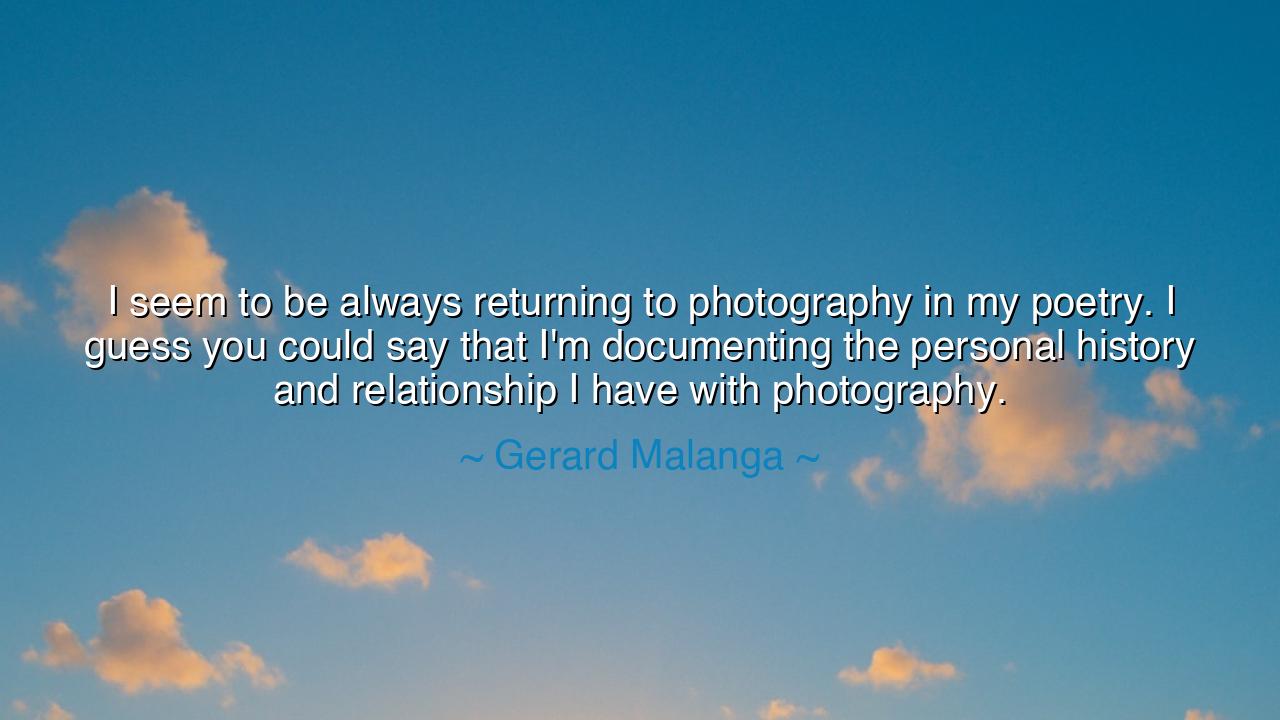
I seem to be always returning to photography in my poetry. I
I seem to be always returning to photography in my poetry. I guess you could say that I'm documenting the personal history and relationship I have with photography.






Hear the reflective words of Gerard Malanga, a poet of vision and memory: “I seem to be always returning to photography in my poetry. I guess you could say that I’m documenting the personal history and relationship I have with photography.” These words speak of the mysterious bond between art forms, where one medium reflects another like a still pool mirroring the sky. In them, we find the essence of memory and the eternal longing to preserve moments that would otherwise vanish like mist at dawn.
To return to photography through poetry is to weave the image and the word into a single tapestry. Photography captures the external world — the precise shapes, faces, and lights of a moment — while poetry captures the inner world of emotion and thought. Malanga’s confession reveals that his verse is more than mere description; it is a sacred act of translation, bringing the silent image into the living realm of language, so that both may speak as one.
In speaking of documenting, Malanga likens his creative process to that of an archivist of the soul. His poetry becomes not just an art form, but a chronicle of his own journey with photography — his memories, inspirations, and transformations. This relationship between the poet and the image is deeply personal, for each photograph is a fragment of time, a relic of his experience, and each poem is the breath that gives it new life.
The origin of this truth lies in the ancient union of sight and word. Long before the invention of the camera, bards and storytellers painted pictures with language, preserving the deeds of heroes and the landscapes of distant lands. With the birth of photography, humanity gained a new way to hold memory, yet the heart still yearned to speak of what lies beyond the visible. Malanga walks this timeless path, bridging the seen and the unseen through his dual devotion to lens and pen.
Let future generations remember: art is not fixed in a single form. Whether through image or verse, we are all documenting the passage of our lives and the worlds we inhabit. When different arts intertwine, as they do in Malanga’s relationship with photography, they reveal deeper truths — that memory is both what we see and what we feel, and that every act of creation is a way of preserving the fleeting light of existence.






MTTran Minh Tuan
Malanga’s reflection on photography in his poetry is a beautiful insight into how personal history can shape creative expression. But it also makes me wonder—how do artists maintain a balance between documenting their own experiences and creating art that resonates universally? Can the personal connection to an art form ever truly be separated from its broader meaning or impact? How does Malanga’s personal relationship with photography enrich his poetry, and what does it reveal about the role of memory in art?
KBTran Khanh Bang
Gerard Malanga’s quote made me think about how art forms intersect in our lives. If photography is central to his poetry, does it suggest that the act of capturing an image helps him process or express emotions that words alone can’t? Can poetry give new life to a photograph by providing context or emotional depth? What does it mean to document a relationship through both visual and written forms—does it create a richer, more layered history?
TNThom Ngo
I find it interesting that Gerard Malanga feels compelled to return to photography in his poetry. It raises a question for me: How much of our personal history and emotional landscape can be captured through both photography and poetry? Are they different ways of understanding the same moments, or do they offer contrasting perspectives? How does his personal history with photography influence his creative process in writing, and does it change the way we view his poetry?
HN16.nguyen hoang nam
This quote highlights the intersection of visual art and literature, which intrigues me. I’m curious about how Malanga uses photography as a form of documentation. Is it about capturing moments that inspire his poetry, or is photography a tool that shapes how he views the world? How does returning to photography in his poetry allow him to preserve personal history, and can it offer deeper insights into his own identity or the human experience?
NLNguyen Lena
Gerard Malanga's connection between photography and poetry is fascinating. It makes me wonder—how does photography influence his writing, and vice versa? Can the act of capturing a moment visually deepen the emotional impact when translated into words? I wonder if his poetry brings a new dimension to the photographs he reflects on. Does he find that the relationship between these two forms of art allows him to process memories and emotions in different ways?